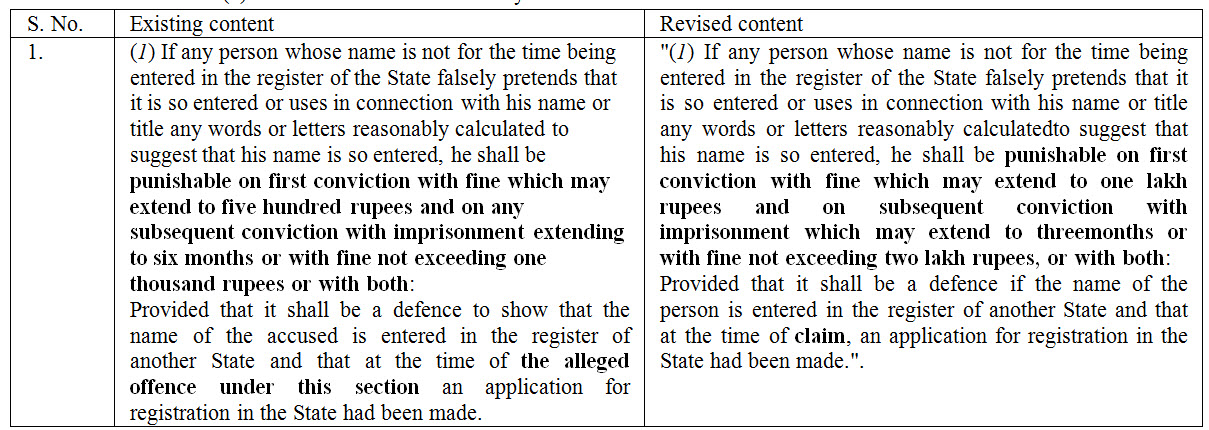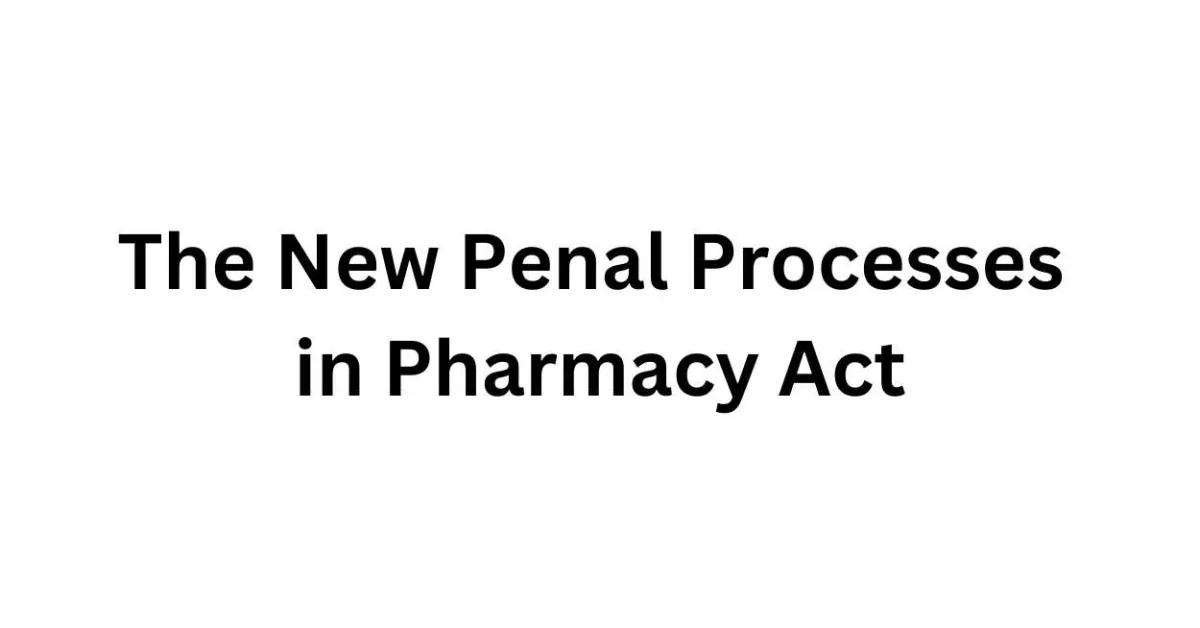 ABOUT AUTHOR
ABOUT AUTHOR
Dr. R. S. Thakur
Former Secretary, Pharmacy Council of India.
Email : drramsthakur@gmail.com
Ministry of Law and Justice (Legislative Department) published the Jan Vishwas (Amendment of Provisions) Act, 2023 in the Gazette of India Extraordinary, Part – II, Section 1, No. 21 on the 11th August, 2023 or one year ago. This Act amended certain enactments for decriminalising and rationalising offences to further enhance trust-based governance for ease of living and doing business. Sub-section (2) of Section 1 of this Act states that it shall come into force on such date as the Central Government may, by notification in the Official Gazette, appoint; and different dates may be appointed for amendments relating to different enactments mentioned in the Schedule. It appears that although one year has passed notification for enforcement of the Act is pending.
Reference Id : PHARMATUTOR-ART-3018
Altogether 42 Central Acts including the Drugs and Cosmetics Act, 1940 (XXIII of 1940) [at Sl. No. 6] and the Pharmacy Act, 1948 (VIII of 1948) [at Sl. No. 9] have been amended. In respect of the Pharmacy Act, amendments have been done in Sections 18, 26A, 41, 42 and 43 and the same are reproduced below :
“9. The Pharmacy Act, 1948 (8 of 1948)
(A) In section 18, in sub-section (2), after clause (h), the following clauses shall be inserted, namely:—
"(i) the manner of holding inquiry and imposing penalty under sub-section (1) of section 43A;
(j) the form and manner of preferring appeal under sub-section (2) of section 43A.".
(B) In section 26A, in sub-section (3), for the words "punishable with imprisonment for a term which may extend to six months, or with fine not exceeding one thousand rupees, or with both", the words "liable to penalty which may extend to one lakh rupees" shall be substituted.
(C) In section 41, for sub-section (1), the following sub-section shall be substituted, namely:—
"(1) If any person whose name is not for the time being entered in the register of the State falsely pretends that it is so entered or uses in connection with his name or title any words or letters reasonably calculated
to suggest that his name is so entered, he shall be punishable on first conviction with fine which may extend to one lakh rupees and on subsequent conviction with imprisonment which may extend to three
months or with fine not exceeding two lakh rupees, or with both:
Provided that it shall be a defence if the name of the person is entered in the register of another State and that at the time of claim, an application for registration in the State had been made.".
(D) In section 42, in sub-section (2), for the words "imprisonment for a term which may extend to six months, or with fine not exceeding one thousand rupees or with both", the words "imprisonment for a term which may extend to three months, or with fine which may extend to two lakh rupees, or with both" shall be substituted.
(E) After section 43, the following section shall be inserted, namely:—
"43A. Adjudication of penalties.—(1) For the purposes of adjudging the penalties under section 26A, the Central Government shall authorise the President of the State Council, where the alleged violation is committed, to be the adjudicating officer for holding an inquiry and impose penalty in the manner as may be prescribed under section 18, after giving any person concerned a reasonable opportunity of being heard.
(2) Whoever is aggrieved by any order of the adjudicating officer may prefer an appeal to the President, Central Council, within a period of forty-five days from the date of receipt of such order in such form and manner as may be prescribed under section 18.
(3) The President, Central Council may entertain an appeal after the expiry of forty-five days, if it is satisfied that the appellant was prevented from sufficient cause for filing the appeal within the said period.
(4) No appeal shall be disposed of unless the appellant has been given a reasonable opportunity of being heard.
(5) An appeal under sub-section (2) shall be disposed of within ninety days from the date offiling.
(6) The amount of penalty imposed under sub-section (1), if not paid, may be recovered as an arrear of land revenue.".”
The effects of all these five amendments are discussed hereunder individually:
1. In order to implement the amendments in Section 18 of the Pharmacy Act, the Pharmacy Council of India has to make regulations with approval of the Central Government and notify in the Gazette of India. The regulations are to be made relating tothe manner of holding inquiry and imposing penalty under sub-section (1) of section 43A by the President of State Pharmacy Council concerned for offences under Section 26A, and the form and manner of preferring appeal against the orders of the President of State Pharmacy council to the President of Pharmacy Council of India, under sub-section (2) of section 43A of the Pharmacy Act. The notification of this Regulation under Section 18 is pending. Therefore, till such time, the Jan Vishwas(Amendment of Provisions) Act, 2023 come into force and the Regulations under Section 18 are in place, the existing procedure and manner in which the action is taken by State Pharmacy Councils in pursuance of sub-section(3) of Section 26A shall continue.
2. The second amendment has correspondingly been done in sub-section (3) of Section 26A of the Pharmacy Act. A comparison of the existing and new provision is appended in Table 1.
Table 1.Sub-section (3) of Section 26A of the Pharmacy Act

The net result is that this amendment waives imprisonment and increases fine from one thousand rupees maximum to up to one lakh rupees.
3. The third amendment has been done by substituting the sub-section (1) of Section 41 of the Pharmacy Act which deals in penalty for falsely claiming to be registered. A comparison of the existing and new provision is appended in Table 2.
Table 2. Sub-section (1) of Section 41 of the Pharmacy Act

The net effects of amending section 41(1) are that on first conviction the fine has been raised from up to five hundred rupees to up to one lakh rupees and on subsequent conviction the imprisonment term has been reduced to up to three months instead of the existing up to six months, whereas the fine has been increased to up to two lakh rupees instead of existing up to one thousand rupees.
4. The fourth amendment is done in sub-section (2) of section 42 of the Pharmacy Act.A comparison of the existing and new provision is appended in Table 3.
Table 3. Sub-section (2) of Section 42 of the Pharmacy Act

The net effect of amending section 41(2)is that dispensing by unregistered persons shall lead to imprisonment up to three months only instead of the existing six months but the fine amount has been increased from up to one thousand rupees to up to two lakh rupees.
5. The fifth and the last amendment is done in Section 43 of the Pharmacy Act which deals in failure to surrender certificate of registration on removal of name from the register under Section 36 of the Pharmacy Act. This is a major revamp in the Act. It inserts a new Section as Section 43A, which reads as under:-
"43A. Adjudication of penalties.—(1) For the purposes of adjudging the penalties under section 26A, the Central Government shall authorise the President of the State Council, where the alleged violation is committed, to be the adjudicating officer for holding an inquiry and impose penalty in the manner as may be prescribed under section 18, after giving any person concerned a reasonable opportunity of being heard.
(2) Whoever is aggrieved by any order of the adjudicating officer may prefer an appeal to the President, Central Council, within a period of forty-five days from the date of receipt of such order in such form and manner as may be prescribed under section 18.
(3) The President, Central Council may entertain an appeal after the expiry of forty-five days, if it is satisfied that the appellant was prevented from sufficient cause for filing the appeal within the said period.
(4) No appeal shall be disposed of unless the appellant has been given a reasonable opportunity of being heard.
(5) An appeal under sub-section (2) shall be disposed of within ninety days from the date of filing.
(6) The amount of penalty imposed under sub-section (1), if not paid, may be recovered as an arrear of land revenue.".”
This new section 43A has been necessitated due to amendments in Sections 18 and 26A for which regulations are to be laid down for the manner of holding inquiry and imposing penalty and therefore, appellate authority and process of disposal of appeal is demand of natural justice.
In nutshell appeal has to be preferred to the President of Pharmacy Council of India within 45 days of receipt of the order of adjudicating officer i.e. President of State Pharmacy Council and the President of Pharmacy Council of India has to decide the appeal within ninety days from the date of filing the appeal.
Moreover, Section 3 of the Jan Vishwas (Amendment of Provisions) Act, 2023 provides for dynamic increase in fine and penalty every three years as depicted below :
3. Revision of fines and penalties. – The fines and penalties provided under various provisions in the enactments mentioned in the Schedule shall be increased by ten per cent. of the minimum amount of fine or penalty, as the case may be, prescribed therefor, after the expiry of every three years from the date of commencement of this Act.
Once the Regulations under Section 18 are in place and the Central Government notifies the effective date of application of the Jan Vishwas(Amendment of Provisions) Act, 2023 in the Gazette of India in respect of the Pharmacy Act, 1948 (VIII of 1948) the new dispensation shall become effective. On the contrary if the National Pharmacy Commission Act comes into existence and enforced prior to the effective date of Jan Vishwas(Amendment of Provisions) Act, 2023; it shall remain an academic exercise only.









